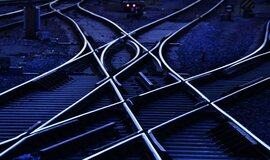
Digital modernisation of the Kleve-Kempen line has begun
Civil engineering work has begun • Customers will be impacted end of May
Deutsche Bahn (DB) has started initial work to equip the Kleve to Kempen railway line with modern signalling technology. As part of the modernisation project, signal boxes in Kleve, Bedburg-Hau, Goch, Weeze, Kevelaer, Geldern, Vernum, Nieukerk, Aldekerk and Kempen are to be replaced with modern electronic signal box technology within a short time. From autumn 2022, operations will be controlled by the six signal boxes in Kleve, Bedburg-Hau, Goch, Kevelaer, Nieukerk and Kempen, which will be digitally upgraded.
Modern signalling and points technology makes the rail network more reliable. It enables better train scheduling and additional travel options in stations during both regular service and construction works, as well as reduced maintenance effort. Underground cabling work will be carried over about 20kms. Around 170 signals and 30 points will be newly installed or upgraded to modern technology. The same applies to 76 level crossings. The first underground cabling works have already begun. Due to the extensive work, there will be night closures from 22 May to 2 July, 2021, followed by full closures between Kleve and Geldern from 16 August to 4 December, 2021. Further closures between Geldern and Kempen are still in the planning stages. On the NordWestBahn’s RE10 line (Niers Express), there will be the following change in service: from the evening of 22 May to 2 July, a rail-replacement bus will run on the section between Krefeld and Kleve.
The replacement concept for the line closure between Geldern and Kleve from mid-August to December is currently being coordinated and planned. To ensure the mobility of passengers during the extensive route closure from mid-August to December, NordWestBahn is currently working on a replacement bus concept in cooperation with the Rhine-Ruhr Transport Association (VRR). Passengers will be given adequate notice of the details.
The VRR welcomes the start of this construction project, which was also largely initiated by the financial commitment of the Verkehrsverbund (public transport authority).
VRR provided €4 million for the examination and implementation of these infrastructural improvements. This meant that the necessary service phases for the ‘DSTW Kleve 2nd construction stage, Kempen-Kleve’ could be implemented at an early stage. It is also thanks to this funding that these measures were included in the federally funded Fast-track Programme (Schnelläuferprogramm: SLP) during implementation.
VRR believes that the modernisation and renewal of control and safety technology will contribute to a significant improvement of operational conditions on the line.
Unfortunately, even with the use of cutting-edge equipment, there will still be some construction noise. We apologise for any inconvenience and ask for your understanding.
Seven Projects of the Fast Track Programme of Digitale Schiene Deutschland
The federal government has provided €500 million for modern signal box technology – from the economic stimulus package to combat the consequences of the coronavirus pandemic. Within a short time period, existing signal boxes and level-crossing safety technology in seven regions will be modernised with digital signal box technology. In close cooperation with industry, processes are currently being optimised and standards established to significantly accelerate project handling.
Thanks to this ambitious project, Digitale Schiene Deutschland (DSD) is creating industrial jobs and supporting medium-sized companies in Germany. Digitalisation also transforms public transport and helps protect the environment. Train passengers are already travelling largely CO2-free. But with smart, digital signal boxes and the European Train Control System (ETCS) offering Europe-wide standardisation, more trains can be used on the same routes. Digitalisation is revolutionising sustainable rail transport: with shorter travel and waiting times and more accurate customer information.